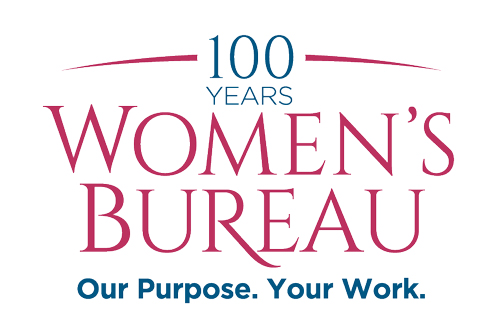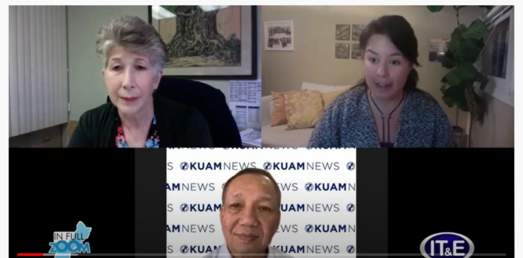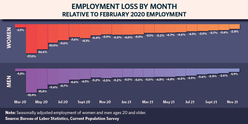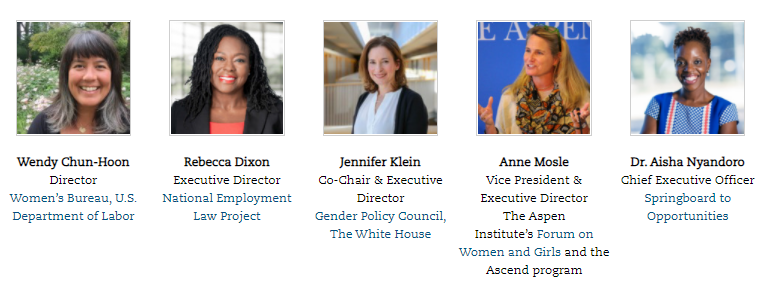
Dear Friends of the Women’s Bureau,
As we close out the year, we reflect on the progress made over the past 12 months and the work that still needs to be done to advance gender and racial equity. Almost two years into a global pandemic, we continue to navigate difficulties around working from home while simultaneously caring for children and elderly family members. The Women’s Bureau has kept a spotlight on the issues that drive the gender and racial wage gap: the need for a national care infrastructure, systemic devaluation of work performed by women, lack of access to better paying jobs for women and communities of color, and discrimination in the workplace. In highlighting these issues over the past year, we’ve been reminded of the concerted effort it will require to overturn longstanding systems of injustice and inequity.
With the goal of dismantling the economic and social structures that work against women—women of color in particular—we’ve endorsed government initiatives that bolster the rights of our nation’s marginalized workers. These initiatives will create job opportunities for women in the workforce, increase access to those jobs for traditionally underrepresented groups, and ensure that those work spaces are fair and unbiased. While we are proud of the innovation we inspire through grant programs like our Women in Apprenticeships and Nontraditional Occupations and Fostering Access, Rights, and Equity, we know we must continue advocating for policies that safeguard the wellbeing of working women and their families.
In the face of troubling realities, we are not dispirited but focused instead on what we’ve accomplished and the progress we are yet to make. The Women's Bureau is expanding career pathways for women and women of color through quality apprenticeship and pre-apprenticeship programs, amplifying resources for working families, and backing the call for global gender equity through strategic effort and action. We persevere, plan, and put into motion the necessary steps to bring about change.
Our team remains optimistic and determined, committed to the work ahead of us. We urge you to remain stalwart champions, advocates and allies, engaged in the Women’s Bureau mission of promoting safe and equitable work environments in 2022 and beyond.
Sincerely,
Wendy Chun-Hoon
Director
Women’s Bureau
U.S. Department of Labor
Combatting Gender-Based Violence and Harassment in the World of Work

On Dec. 20, Women’s Bureau Director Wendy Chun-Hoon sat down with journalist Nestor Licanto and Jayne Flores, director of Guam’s Bureau of Women’s Affairs, to discuss efforts to rebuild Guam’s economy. Guam's Bureau of Women’s Affairs is a 2021 recipient of the Women’s Bureau Fostering Access, Rights, and Equity (FARE) grant, which helps women workers who are paid low wages learn about their employment rights and benefits. The conversation touched on critical efforts to eliminate gender-based violence and harassment in the workplace.

On Dec. 16, we joined activists and public sector leaders in a conversation about pay equity and the future of economic security for women. This event was part of the 2021 EqualPayMA roundtable series co-hosted by the Massachusetts Commission on the Status of Women and the Massachusetts Women of Color Coalition.
- View the webinar (passcode: @tJe3&EG)

On Dec. 15, the Women’s Bureau joined the International Labour Organization, the Solidarity Center, Employment and Social Development Canada, the American Federation of Labor–Congress of Industrial Organizations, the U.S. Agency for International Development and the U.S. Council for International Business to elevate the global discussion series, A World of Work Free from Violence and Harassment. The event was part of the international annual 16 Days of Activism against Gender-Based Violence campaign that begins on Nov. 25, the International Day for the Elimination of Violence against Women, and concludes on Dec. 10, Human Rights Day.
Mapping out Strategies to Achieve Gender Equity and Equality
On Dec. 14, Women’s Bureau Director Wendy Chun-Hoon took part in The Aspen Institute’s forum, Moving to Action: The National Strategy on Gender Equity and Equality, to discuss the importance of the White House National Strategy on Gender Equity and Equality in addressing gender discrimination, dismantling barriers to women's workforce participation and strengthening the economy by investing in care infrastructure.
Rebuilding the Economy Requires Rebuilding Care Infrastructure

Overall, adult women’s employment and labor force participation rates have increased since the pandemic began, but women workers have been forced to leave 2.3 million jobs, including over 700,000 in education and health services. The case is even more critical for women of color, who have not experienced any economic recovery. Black women and Latinas continue to see the greatest employment losses.
WB in the News

Only 2.3% of plumbers in the United States are women. Public News Service article, "Pay Equity Coalition: With Job Creation, Increase Access for Women," examines how the Women’s Bureau is working to address structural racism and sexism by facilitating access to higher-paying jobs for women.
White House Releases
Vice President Harris announces call to action to reduce maternal mortality and morbidity and commemorates inaugural Maternal Health Day of Action
President Biden's Bipartisan Infrastructure Law aims to invest in communities that are too often left behind, create good jobs and support equity in employment opportunities.
Follow the Women's Bureau on Twitter: @WB_DOL

The Women’s Bureau has championed the rights of working women and served as a convener of conversations critical to an equitable economy for women for more than 100 years.
Follow us at @WB_DOL to view our #FridayFirsts series highlighting pioneering women, and to learn more about the latest research, initiatives, policies, and updates related to working women and their families.

